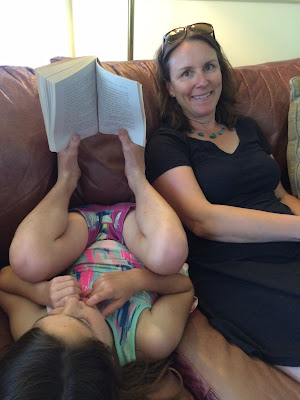
I’m pretty sure there’s a verse in the bible that refers to
me and my brothers, Michael and Joel, and our Nenana friends. It reads: “You
will know them by their forts,” and to that I would add,
secret forts, because secret is always the better part of it. Maybe
the best part.
Not long ago, I got reacquainted with one of those old
friends, George Albert, from the 1950s. He wasn’t a kid I played with a lot; I
think he was younger. But he got me right away with this opener: “remember when
we built the fort behind the church?”
You darn betcha. I remember every fort I ever built.
We built one that was three or four stories up three trees.
It was a masterpiece. I think that’s the one George remembers. But we built
another one out of logs at the back of that same lot. The second
one stood only about four feet tall made of horizontal logs — okay, poles. And
it turned out to be even better than the tall one.
We put a lot of thought into the secret part of it. We built it near the road but slightly back in the
brush. We covered the scrap-board roof with whatever, and then over that a layer
of leaves and sticks for cammo. We hadn’t mastered doors and windows in a ‘log’
structure, which didn’t matter. The gaps between the poles were big enough to
throw a cat through. So, we dug a low spot, what we called a tunnel, to slide
in and out on our bellies
It was the most secret fort you’ve ever seen, or not seen.
One morning, the fort is finished and we’re in there, not
being seen by anybody. Which by itself is pretty boring. The adventure begins
when a pickup truck stops about forty feet away. We’re all over this: the
chance to spy!
There had been four people crowded into the cab, and two men and a woman come tumbling out. They are drunk. I now know they were
too insanely drunk to be out driving around. I didn’t think about that then. Instead
I thought about what they thought about, which was that one of them might be
dead.
Our gang went from secret spying to active participants in
seconds, crowding around for a better look. I got to give it to the guy in the
cab, he looked sincerely dead. If he were in Hollywood, trying out for the part
of ‘the dead guy,’ I have no doubts he’d have it.
Somehow, his three drunk friends, have learned that they can
determine life or death for certain, with a mirror.
I am all over this, Jonny-to-the-rescue, instantly off running
across the block at top speed because I know where there’s a mirror. I take the
short cut through the woods, leaping downed logs, muddy pits, constantly alert for
dangers — just in case there are any. In less than sixty seconds, I’m rifling
my mother’s purse for her compact.
“What are you doing in my purse?” Comes her voice, from the
kitchen.
“I’m borrowing your mirror.”
“What do you need my mirror for?”
“Got to figure out if a guy is dead.”
“Oh,” she says. “Okay,” and I heard her put something in the
oven.
Then I’m back across the block, dodging and hurtling things.
In my mind I’m Red Grange, The Galloping Ghost, scattering defenders down the
backfield. I’m Brit runner, Roger Bannister, breaking the four. I’m Tonto or
Cochise streaking across country too rough for U.S. Cavalry horses to follow. And in
under two minutes, I’m back with the holy mirror.
These three, staggering and muttering, receive the mirror
gravely. They look at each other, nodding. This is serious stuff and they know
it. My brothers and I, along with our friends crowd closer. Mostly because, if
they drop that mirror, which seems likely, one of us must catch it if we’re ever gonna know if this guy is dead.
The moment is at hand. One of them, the leader I suppose,
takes the mirror, huffs on it, his breath nearly blacking me out. I’m surprised
the alcohol fumes didn’t melt the plastic — and he buffs the glass on his sleeve. Then,
we all hold our breath as he positions the mirror above the guy’s wrist.
“Yep,” he said, “dead.”
As it turned out, the guy was dead. Not that they could
tell. I’ve never forgotten the adventure of that secret fort. And it makes me
sincerely happy to get reacquainted with George Albert after more than fifty
years, and to know that he agrees. “Remember when we built that fort behind the
church?” You darn betcha. I remember.
The Bible says it and it’s good enough for me: “You will know
them by their forts.”








